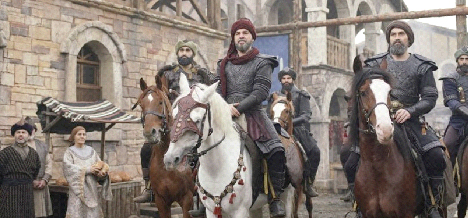
Nostalgia for a mythical past and its glorification are not therapeutic, though they may create euphoria. Literature (books and pamphlets) and entertainment (movies and plays) projecting false history to soothe a people’s disturbed psyche tend to do more damage since they distort reality. They confuse, rather than enlighten their audience. I have in mind the current popularity of a Turkish drama, Durilis: Ertugrul, which looks back to an age of violence and destruction. There is no harm in giving fictionalised account of events provided it is rooted in reality and instigates morally correct behaviour. The inspiration for revival should be sought from the golden age of knowledge and not from the age of aggression.
Exactly 50 years ago, I spent a year in Turkey. It wasn’t the best of time for the people. I left the country with some fond memories and many questions. My first impression was that the Kemalist ideology of secular nationalism and its imposition on the people of Turkey after World War I was a costly burden on Turkish society. It bred xenophobia and false pride; it distorted modernization and it divided people. A quick and complete break from the past by fiat cannot be good for any healthy society. But what had the Ottomans achieved in their empire that lasted for about 600 years? The short answer is: that they had nothing of substance to their credit in science, philosophy or technology, except perhaps weaponry.
The first mechanical printing in Europe was started at about the time the Ottomans captured Constantinople. But this technology wasn’t allowed in Turkey until the late eighteenth century. The Industrial Revolution had spread in most parts of Western Europe by the middle of nineteenth century, but it made almost no impression on Turkey until the early twentieth century. Why did Turkey not borrow from Europeans the new methods of science and technology? Why did the administrative reforms (Tanzimat) of Sultan Mahmud II and his son Abdulmejid I, undertaken in the second half of the nineteenth century (1839-1876), fail to have a positive outcome? Finally, why is it that, at the dissolution of the Ottoman Empire in the early 1920s, Turkey was not in any better economic or technological state than its colonies in the Balkans? It may have in fact lagged behind some of them.
These questions raise a broader issue about Muslim societies in general. The golden age of Islamic philosophy, science, technology and literature lasted from about the mid-ninth to mid-thirteenth century. The patrimony of the ancient Greeks, Romans and Muslims was then passed on to Europe where it played a central role in the ages of Renaissance and Enlightenment and eventually in building an industrial society. The global spread of Europe’s imperial power after the fifteenth century was a consequence of the Crusades on the eastern and western ends of the Mediterranean.

In the Muslim world, the tree of knowledge had withered and died by the mid-fourteenth century. Perhaps the Ashari creed and some of al-Ghazali’s writings, backed by the power elite, were its primary cause. The Crusades in the Greater Syria and Andalusia, followed by the Mongol invasion of Central Asia, Persia and Iraq, destroyed once flourishing caliphates. In Andalusia the crumbling rule of the Umayyad successors and the warrior sultans in the Near and Middle East were preoccupied with fighting and conquering land with little time for peace or stability. By about the beginning of the sixteenth century, there were three main Muslim empires: the Ottoman in Turkey and in parts of the Arab lands, the Safavid in Persia and the Mughal in India. These empires lasted for centuries, but they neither revived the lost Muslim Enlightenment nor showed much interest in learning from Europe as it was making progress. By the early eighteenth century, the internally-decaying Muslim empires were no match to the imperial power of Europeans. Muslim societies across sultanates and khanates, were in a state of deep slumber for centuries, from which their awakening has since been tumultuous and grindingly slow. Paradoxically European imperialism has been the source of this awakening.
There are three choices. One is to march ahead without the unnecessary baggage from the past. Second is to resist and fight all modernity by violent means if necessary. Third is to look back with nostalgia to a mythical or illusory past and grope for a future like this past. The first choice means establishing a secular, liberal, progressive, and democratic order. The second implies an authoritarian regime based on laws made by a deity and not man. The third one is a mongrel of the other two without a clear vision. This approach creates confusion because of the mixed or contradictory claims and promises. Promoting Ertugrul, entertaining though this drama might be for some, is sadly part of this agenda.
The writer is Emeritus Professor at Simon Fraser University, Canada
Exactly 50 years ago, I spent a year in Turkey. It wasn’t the best of time for the people. I left the country with some fond memories and many questions. My first impression was that the Kemalist ideology of secular nationalism and its imposition on the people of Turkey after World War I was a costly burden on Turkish society. It bred xenophobia and false pride; it distorted modernization and it divided people. A quick and complete break from the past by fiat cannot be good for any healthy society. But what had the Ottomans achieved in their empire that lasted for about 600 years? The short answer is: that they had nothing of substance to their credit in science, philosophy or technology, except perhaps weaponry.
The first mechanical printing in Europe was started at about the time the Ottomans captured Constantinople. But this technology wasn’t allowed in Turkey until the late eighteenth century. The Industrial Revolution had spread in most parts of Western Europe by the middle of nineteenth century, but it made almost no impression on Turkey until the early twentieth century. Why did Turkey not borrow from Europeans the new methods of science and technology? Why did the administrative reforms (Tanzimat) of Sultan Mahmud II and his son Abdulmejid I, undertaken in the second half of the nineteenth century (1839-1876), fail to have a positive outcome? Finally, why is it that, at the dissolution of the Ottoman Empire in the early 1920s, Turkey was not in any better economic or technological state than its colonies in the Balkans? It may have in fact lagged behind some of them.
These questions raise a broader issue about Muslim societies in general. The golden age of Islamic philosophy, science, technology and literature lasted from about the mid-ninth to mid-thirteenth century. The patrimony of the ancient Greeks, Romans and Muslims was then passed on to Europe where it played a central role in the ages of Renaissance and Enlightenment and eventually in building an industrial society. The global spread of Europe’s imperial power after the fifteenth century was a consequence of the Crusades on the eastern and western ends of the Mediterranean.

In the Muslim world, the tree of knowledge had withered and died by the mid-fourteenth century. Perhaps the Ashari creed and some of al-Ghazali’s writings, backed by the power elite, were its primary cause. The Crusades in the Greater Syria and Andalusia, followed by the Mongol invasion of Central Asia, Persia and Iraq, destroyed once flourishing caliphates. In Andalusia the crumbling rule of the Umayyad successors and the warrior sultans in the Near and Middle East were preoccupied with fighting and conquering land with little time for peace or stability. By about the beginning of the sixteenth century, there were three main Muslim empires: the Ottoman in Turkey and in parts of the Arab lands, the Safavid in Persia and the Mughal in India. These empires lasted for centuries, but they neither revived the lost Muslim Enlightenment nor showed much interest in learning from Europe as it was making progress. By the early eighteenth century, the internally-decaying Muslim empires were no match to the imperial power of Europeans. Muslim societies across sultanates and khanates, were in a state of deep slumber for centuries, from which their awakening has since been tumultuous and grindingly slow. Paradoxically European imperialism has been the source of this awakening.
There are three choices. One is to march ahead without the unnecessary baggage from the past. Second is to resist and fight all modernity by violent means if necessary. Third is to look back with nostalgia to a mythical or illusory past and grope for a future like this past. The first choice means establishing a secular, liberal, progressive, and democratic order. The second implies an authoritarian regime based on laws made by a deity and not man. The third one is a mongrel of the other two without a clear vision. This approach creates confusion because of the mixed or contradictory claims and promises. Promoting Ertugrul, entertaining though this drama might be for some, is sadly part of this agenda.
The writer is Emeritus Professor at Simon Fraser University, Canada

